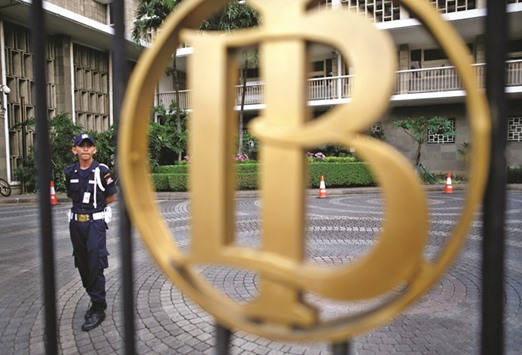Indonesia’s central bank, seeing a window of opportunity after the Federal Reserve held US interest rates, surprised financial markets yesterday by cutting its main rates in a bid to lift sagging growth in Southeast Asia’s largest economy.
Bank Indonesia (BI) cut both of its current and future benchmark rates by 25 basis points (bps) to 6.50% and 5.25%, respectively.
The central bank will shift to the new benchmark, the 7-day reverse repurchase rate, on August 19.
It also cut deposit and lending facility rates by 25 basis points and unveiled other measures to boost slowing loan growth, including increasing the loan-to-value ratio for property lending.
“Bank Indonesia is going all out, they are being really aggressive this time,” said Aldian Taloputra, economist with Standard Chartered in Jakarta.
BI’s two-day policy meeting ended just hours after the US Federal Reserve decided to keep its own benchmark interest rate unchanged.
“Last night, with the Fed deciding to delay a FFR (federal funds rate) hike, it is a chance to ease,” said Juda Agung, the central bank’s executive director of monetary and economic policy.
Out of 19 analysts surveyed by Reuters early this week, 13 had expected BI to hold the benchmark rate and six forecast a 25 basis points cut.
One week earlier, the Bank of Korea also surprised markets by cutting interest rates to a record low.
Analysts have speculated that Asian central banks facing slowing economic growth have an opportunity to ease now that the US dollar is losing steam as the Federal Reserve turns more cautious on the US economy and interest rates.
A softer dollar gives emerging economies room to cut borrowing costs with less risk of undermining their own currencies. With yesterday’s moves, BI resumed after a two-month pause an easing cycle started early this year with three rate cuts totalling 75 basis points.
The central bank has also reduced banks’ reserve requirement ratio to effectively inject money into the financial system. Gareth Leather, economist with Capital Economics, said “more easing is likely this year, although worries about the high level of foreign currency debt and the strength of the rupiah mean the pace of future rate cuts is likely to be gradual”.
Asked if there’s more room for easing, BI’s Agung said “We will see the progress ahead. We see inflation is manageable. For global, we have to see Brexit, FFR. That’s the issues that we need to be cautious about.”
Inflation, often a major economic problem for Indonesia, has been under control. In May, the annual headline rate was 3.33%, the lowest in seven years.
Indonesia’s annual economic growth rate in the first quarter was a disappointing 4.9%, forcing BI to cut its outlook for the full year to 5%-5.4% from 5.4%-5.6% earlier in the year.
BI’s policy announcements came after Jakarta markets closed yesterday.
In Singapore, one-month dollar/rupiah non-deliverable forwards (NDFs) hit a session high on the rate cuts.
In April, BI announced the change from its benchmark rate to the 7-day one, which should help it have more influence on market rates.

A security guard stands near a gate outside the Bank Indonesia headquarters in Jakarta. The central bank cut both of its current and future benchmark rates by 25 basis points to 6.50% and 5.25 %, respectively yesterday.
